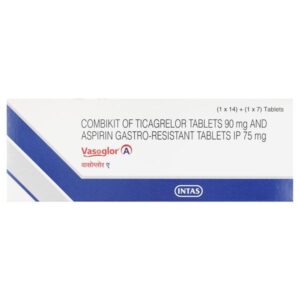TICAGRELOR + ASPIRIN
Ticagrelor: Ticagrelor is an antiplatelet medication that is primarily used to prevent blood clots in individuals with acute coronary syndrome (ACS), which includes conditions like unstable angina or myocardial infarction (heart attack).
The mechanism of action of ticagrelor involves inhibiting the P2Y12 receptor on platelets, which prevents platelet aggregation and the formation of blood clots. Unlike other antiplatelet medications, ticagrelor also has an additional effect of increasing the levels of adenosine in the blood, leading to vasodilation and improved blood flow.
The typical dose of ticagrelor is 90 mg taken orally twice daily. It should be taken with or without food. For the first year after an ACS event, ticagrelor is often prescribed in combination with low-dose aspirin (usually 75-100 mg daily). After that, ticagrelor can be continued as a monotherapy.
As with any medication, ticagrelor may cause side effects. Common side effects include bleeding (like nosebleeds, bruising, or bleeding gums), shortness of breath, headache, nausea, and an increased risk of infections. Less common but more serious side effects may include severe bleeding, liver or kidney problems, and allergic reactions. It is important to contact a healthcare professional if any concerning side effects occur.
Ticagrelor may also interact with other medications, so it is crucial to inform healthcare providers about all current medications and medical conditions before starting this drug. Additionally, ticagrelor may increase the risk of bleeding, so caution should be exercised in individuals with a history of bleeding disorders or recent surgery.
Overall, ticagrelor is an effective antiplatelet medication that helps prevent blood clots and is commonly used in the treatment and prevention of ACS. However, it is important to use this medication under the guidance of a healthcare professional and be aware of the potential side effects.
Aspirin: Aspirin, also known as acetylsalicylic acid, is a nonsteroidal anti-inflammatory drug (NSAID) that is widely used for its analgesic, antipyretic, and antiplatelet effects. It is commonly used to relieve pain, reduce inflammation, lower fever, and prevent blood clot formation.
The mechanism of action of aspirin mainly involves inhibiting the production of prostaglandins, which are chemical compounds involved in pain, fever, and inflammation. Aspirin irreversibly inhibits the enzyme cyclooxygenase (COX), which is responsible for the production of these prostaglandins. This results in decreased pain, inflammation, and fever.
The recommended dose of aspirin varies depending on the intended use. For pain relief and fever reduction, the usual adult dose is 325 to 650 mg every 4 to 6 hours as needed, with a maximum daily dose of 4 grams. For its antiplatelet effects, a lower dose of 75 to 100 mg is commonly used in the prevention and management of cardiovascular diseases, such as heart attack and stroke.
While aspirin is generally considered safe, it can cause several side effects. The most common side effect is gastrointestinal upset, including stomach pain, heartburn, and nausea. Aspirin can also increase the risk of bleeding, especially when used in higher doses or in combination with other medications that also increase bleeding risk. Long-term or high-dose use of aspirin may be associated with a higher risk of gastrointestinal ulcers, kidney problems, and tinnitus (ringing in the ears). In rare cases, aspirin can cause an allergic reaction, which may manifest as difficulty breathing, facial swelling, or hives, and requires immediate medical attention.
It is important to note that aspirin should not be used in certain individuals, such as those with a known allergy to aspirin, active bleeding disorders, or a history of stomach ulcers. Additionally, aspirin should be used with caution in individuals with certain medical conditions, such as asthma, liver or kidney problems, and uncontrolled hypertension. It is recommended to consult with a healthcare professional before starting or changing any medication regimen, including aspirin.

